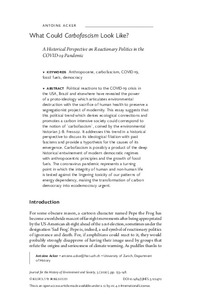What could carbofascism look like? A historical perspective on reactionary politics in the COVID-19 pandemic

Journal for the History of Environment and Society
2020
5
135-148
epidemic disease ; populism ; democracy ; energy source
Politics
https://doi.org/10.1484/J.JHES.5.122470
English
Bibliogr.
"Political reactions to the COVID-19 crisis in the USA, Brazil and elsewhere have revealed the power of a proto-ideology which articulates environmental destruction with the sacrifice of human health to preserve a segregationist project of modernity. This essay suggests that this political trend which denies ecological connections and promotes a carbon intensive society could correspond to the notion of ´carbofascism´, coined by the environmental historian J.-B. Fressoz. It addresses this trend in a historical perspective to discuss its ideological filiation with past fascisms and provide a hypothesis for the causes of its emergence. Carbofascism is possibly a product of the deep historical entwinement of modern democratic regimes with anthropocentric principles and the growth of fossil fuels. The coronavirus pandemic represents a turning point in which the integrity of human and non-human life is tested against the lingering toxicity of our patterns of energy dependency, making the transformation of carbon democracy into ecodemocracy urgent."
Digital
The ETUI is co-funded by the European Union. Views and opinions expressed are however those of the author(s) only and do not necessarily reflect those of the European Union or the ETUI.